Ryding High: A Look at French Golf as the Ryder Cup Heads to France
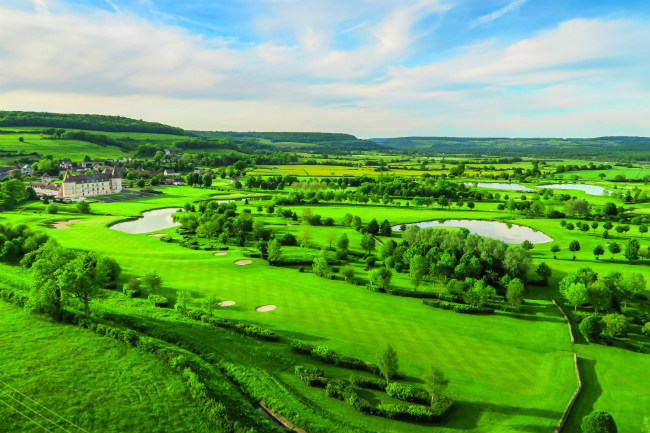
As the Ryder Cup heads to France for the first time in the competition’s history, Dominic Bliss takes a look at the nation’s love-hate relationship with golf
“He’s surely not going to climb down in there and try to whack out of there? No, that would be totally ridiculous. What on earth are you doing? No Jean, please! Would someone kindly go and stop him. Give him a large brandy and mop him down.”
This was the commentator’s advice when French golfer Jean van de Velde, on the final hole and right on the cusp of victory at the 1999 British Open (at the Scottish club Carnoustie), suddenly struck his ball into a stream. As if this wasn’t humiliating enough, he then proceeded to take off his shoes and socks, roll up his trousers, and wade into said stream for a closer look.
“This is beyond a joke,” the incredulous commentator continued. “He’s gone gaga. To attempt to hit the ball out of there is pure madness.”
It really did look like Van de Velde, France’s greatest hope in almost a century, had indeed gone gaga. Throughout the entire tournament he had been on cracking form. All he had to do was complete that final hole in six shots in order to earn his place in history as the first Frenchman since 1907 to win the British Open – an easy task.
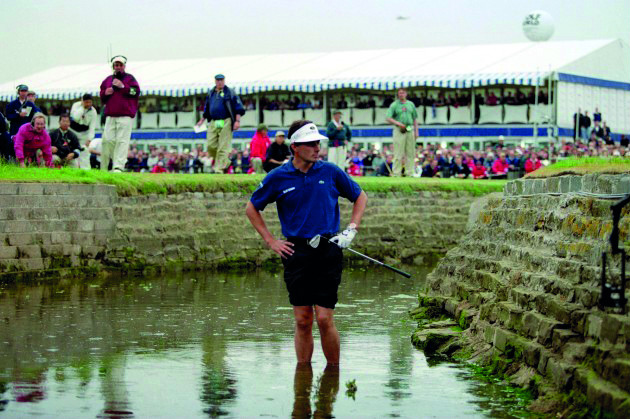
Jean van de Velde’s meltdown at the 1999 Open has gone down in golf history
THE GREAT FRENCH MELTDOWN
Or so everyone thought. What actually happened was beyond farcical. His tee shot landed on a peninsula of land surrounded by water. His next struck the top of a grandstand near the green, bounced off the stone wall on the edge of the stream, and then went backwards into knee-high rough. On his third shot, his swing got tangled in the undergrowth and plopped the ball straight into the water.
Van de Velde eventually completed the hole after 23 minutes of cringing embarrassment, allowing his rivals to draw level. The Frenchman then lost the subsequent play-off.
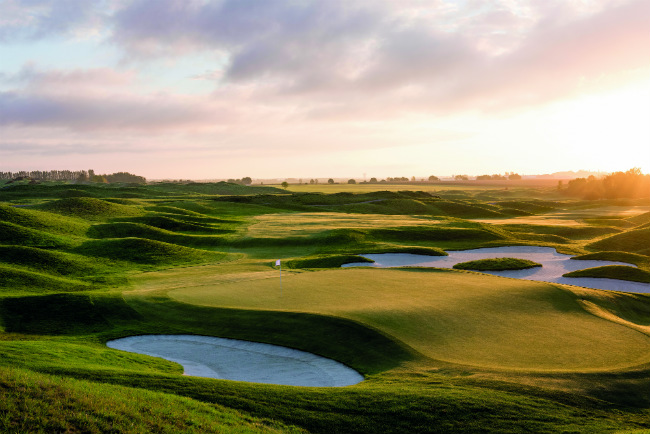
Paris’s Golf National will host the 2018 Ryder Cup in September
In sport, they call it snatching defeat from the jaws of victory. But worse than that, Van de Velde will forever be remembered standing shin-deep in the water hazard at Carnoustie. Mention French golf to your average British fan and, even 19 years later, this is the image they still recall.
That’s a great shame since, according to the Fédération française de golf, the sport is in fine fettle on the other side of the Channel. There’s a total of 733 golf clubs across France, serving more than 410,000 licensed players. Over 22,000 of those players have a healthy handicap of under 10.
French golf has been growing steadily since the 1980s when it benefited enormously from an expansion programme which saw around 350 courses constructed within 10 years, often thanks to government tax breaks for farmland converted to leisure use. The federation now operates all manner of promotions and taster sessions in order to encourage more youngsters into the sport. There are currently 624 official golf schools in operation.
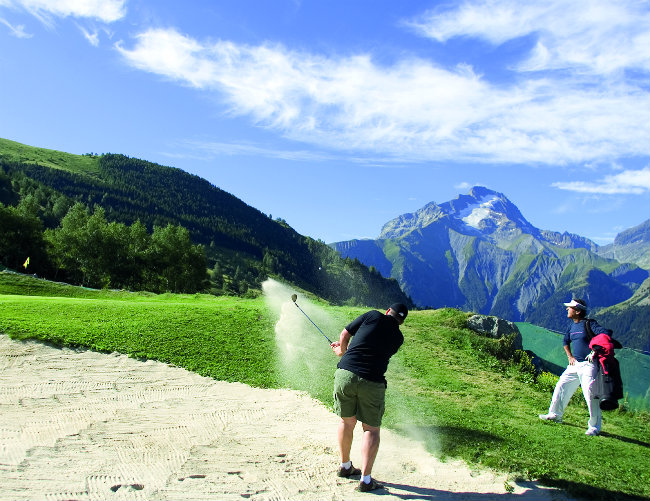
The stunning mountainous backdrop of Les 2 Alpes Golf Course. Photo: OT Les 2 Alpes/ Boulgakow
IMAGE ISSUES
But this is small fry compared to the British golfing scene. Across England, Scotland and Wales, there are more than 2,600 affiliated golf clubs, and not far off a million licensed players. More if you count Northern Ireland. The UK is awash with successful professionals, too. Right now in the official world rankings, home nations have four players in the top 20 men (including Justin Rose and Rory McIlroy), and three in the top 50 women. Yet the top-ranked French players are Alexander Lévy, down at 47 in the world, and Karine Icher at 81.
Agathe Séron is a French golf media professional who has worked in the sport for the last 15 years. She admits that while British golf has advanced swiftly up the fairway, French golf is still very much stumbling around in the rough. The reason, she believes, is that Britons have had so much longer to develop the sport. Indeed, they’ve been striking little white balls across vast lawns since the 15th century. “The first French golf course wasn’t built until 1856, in Pau,” Agathe explains. “And that was by British expats. We had to wait another 35 years or so for our next golf course.”
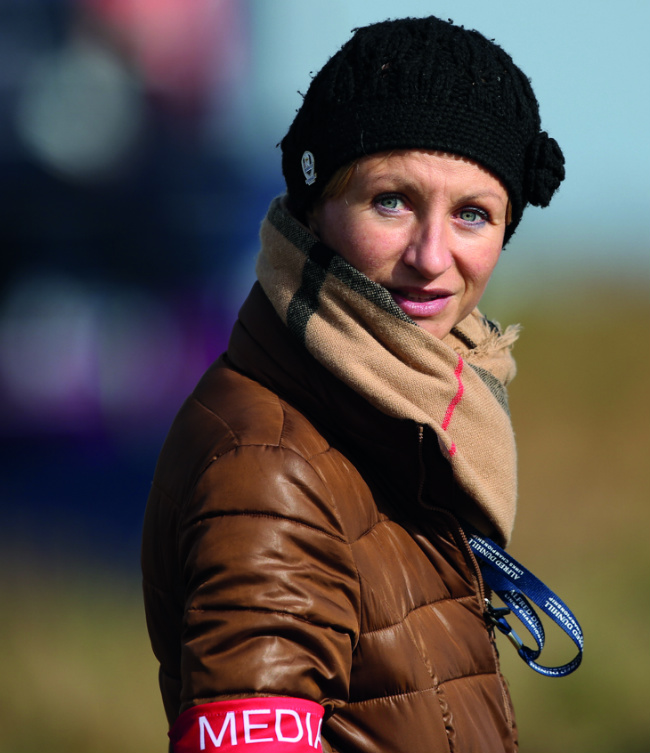
Agathe Séron is a French golf media professional. Photo: David Lloyd
British golf was also given a boost thanks to its royal connection. The game was originally very elitist, played by royals and the aristocracy, so that the rest of society aspired to join the party. Golf and the culture surrounding it became an important badge of class.
“This is something we never had in continental Europe,” Agathe adds. “If Louis XIV had played golf in Versailles, I think the sport would have been much more successful, much earlier on.”
According to her, the sport suffers because the French mistakenly believe it is prohibitively expensive. She points out how, when it comes to children’s sport, golf is actually considerably cheaper than football, rugby, swimming or horse riding. “The image is false,” she says. “Golf is actually very cheap for children. Even in the Paris region, you can have a one-hour lesson every week for around €200 a year.”
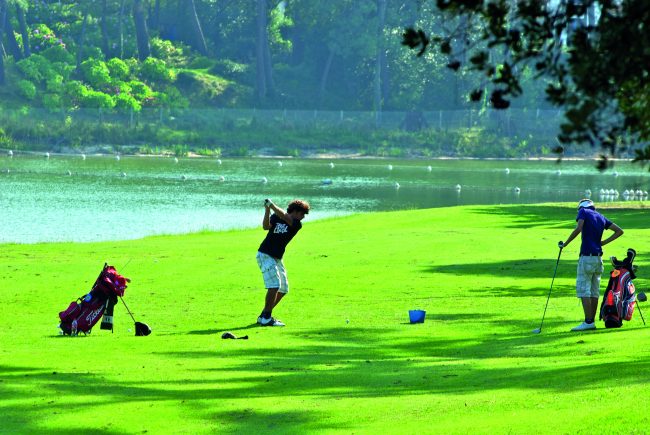
Photo credit: Biarritz’s Golf Chiberta
She also thinks French golf clubs are missing a trick by not encouraging more tourists to play. “France is one of the most popular tourist destinations in the world. Unfortunately, though, tourists don’t think of France as a golf destination. We’re missing something there. We have 700 golf clubs, and they’re not crowded, so you can easily play. For me, this is an asset that we French do not explore or use properly.”
Indeed, there are some achingly beautiful golf courses in France, if you know where to look. One that will be making headlines this year is Le Golf National’s Albatros course, which will host the Ryder Cup – the famous biennial clash between Europe and the United States – from September 28 to 30. And what a jamboree it’s going to be.
The organisers, Ryder Cup Europe, claim the spectator experience will be “amazing, with natural mounding, giving a stadium feel on most holes”. The course will have 15km of new pathways, plus 10,500 grandstand seats including an amphitheatre grandstand behind the 18th green and the first tee area with space for 6,800 people. Expecting a huge influx of spectators, they will be offering bus transfers from car parks in Louveciennes, Versailles and Orsay, and from railway stations at Massy-Palaiseau and Saint-Quentin-en-Yvelines.
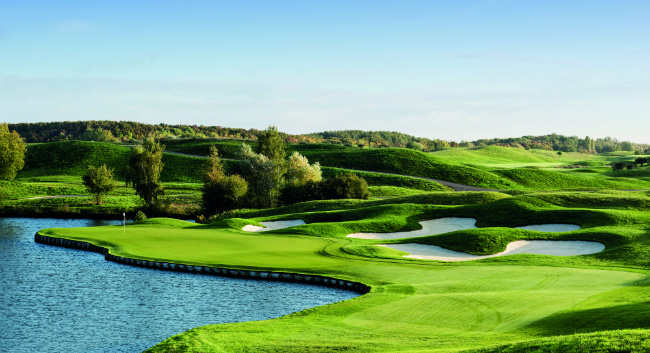
Paris’s Golf National will host the 2018 Ryder Cup in September
Surely, with so many spectators, players, sponsors and media descending on Paris, amateur golf across France as a whole will benefit? The French federation has piggybacked on the Ryder Cup by organising various taster sessions for new players, and there will be plenty of golf on the French TV channels.
But, remember, the tournament lasts only three days. Agathe believes the amateur game will benefit much more from a new short format of the game designed to attract beginners, families, and working people who lack the time to play 18 holes. She cites the example of one provider, Bluegreen, which offers miniature golf, after-work sessions and pay-as-you-play at 49 courses across the country.
But France has a long way to go before it starts producing players with the calibre to win the major tournaments. In fact, there has only ever been one male French player to win a major, and that was Arnaud Massy, at the British Open, all the way back in 1907, when ownership of a decent set of golf clubs was often enough to make the cut. He was hardly what you’d call golfing pedigree. The son of a Basque sheep farmer, his main employment was as a sardine fisherman, but he supplemented his income by caddying at the new course in Biarritz.
So when can we expect to see the next Frenchman winning a major? “We are desperately waiting. But our players have an issue with the mental side of the game,” Agathe admits. “Our best shot now is Alex Lévy. I don’t think anyone but him could win a major right now. I’ve been looking at the young ones coming through and so far I haven’t seen anyone.”
If Alex doesn’t step up to the mark, French fans will have to settle for the next best thing: Jean van de Velde, barefoot in a Scottish stream, with his trousers rolled up. “Don’t say that!” Agathe exclaims. “I’m a big fan of Jean, and that was a nightmare for us!”
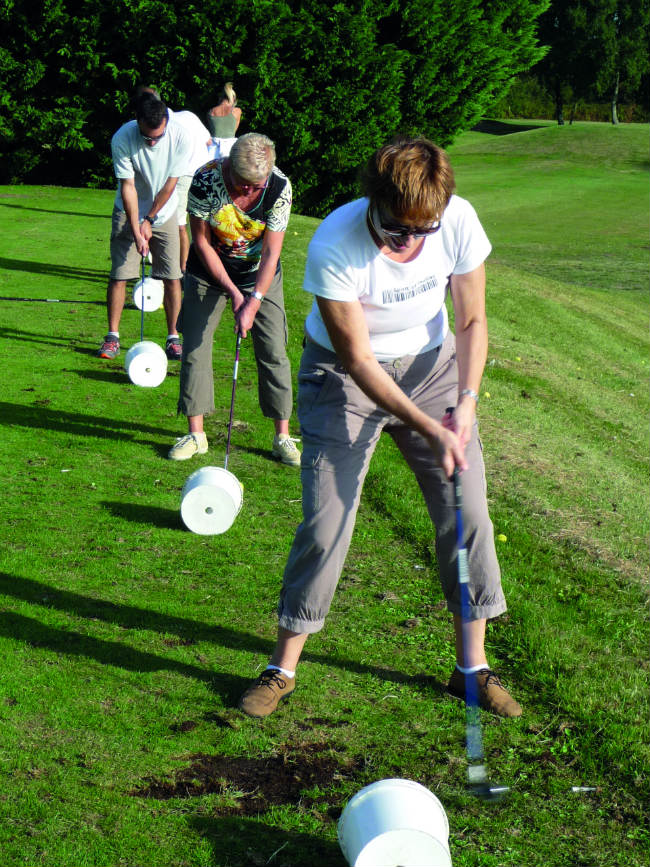
Learners get into the swing of things at Pessac Golf Club near Bordeaux. Photo credit: Brigitte Bloch
FIVE OF FRANCE’S TOP GOLF COURSES
The green fees at these venues will break the bank, but it’s all worth it for the ultimate golfing experience in France.
GOLF DE FONTAINEBLEAU
With its fairways weaving through the gorgeous Forêt de Fontainebleau, south of Paris, this course is described by golfbreaks.com as “amazing”. Hazards include an oak tree on the 8th hole, planted in 1680 by Louis XIV. www.golfdefontainebleau.org
LES BORDES
Les Bordes Old Course, in the heart of the Loire Valley, was voted continental Europe’s most beautiful by Golf World magazine in 2009. “It should unquestionably, undeniably, be in anyone’s top five courses in the world,” they stated. It was designed by American architect Robert von Hagge. www.lesbordes.com
GOLF DE CHANTILLY, VINEUIL
British designer Tom Simpson had a hand in many of France’s finest courses. The beautiful yet testing Vineuil course at the Golf de Chantilly, north of Paris, is one of them. “The tough layout has brutally unforgiving rough,” says golfbreaks.com. www.golfdechantilly.com
LE GOLF NATIONAL, L’ALBATROS
Chosen for this year’s Ryder Cup and a regular venue for the Open de France, L’Albatros has been described by golfbreaks.com as “arguably perfectly suited for matchplay, with many of the closing holes sided by water”. www.golf-national.com
LE TOUQUET GOLF RESORT
For decades Le Touquet Golf Resort, on the northern coast, has been luring British golfers across the Channel. P. G. Wodehouse was a great fan. Once host of six Opens de France, it has three courses. Head for La Mer links course for “a rare environment with its subtle, complex and windy holes”. www.letouquetgolfresort.com
From France Today magazine
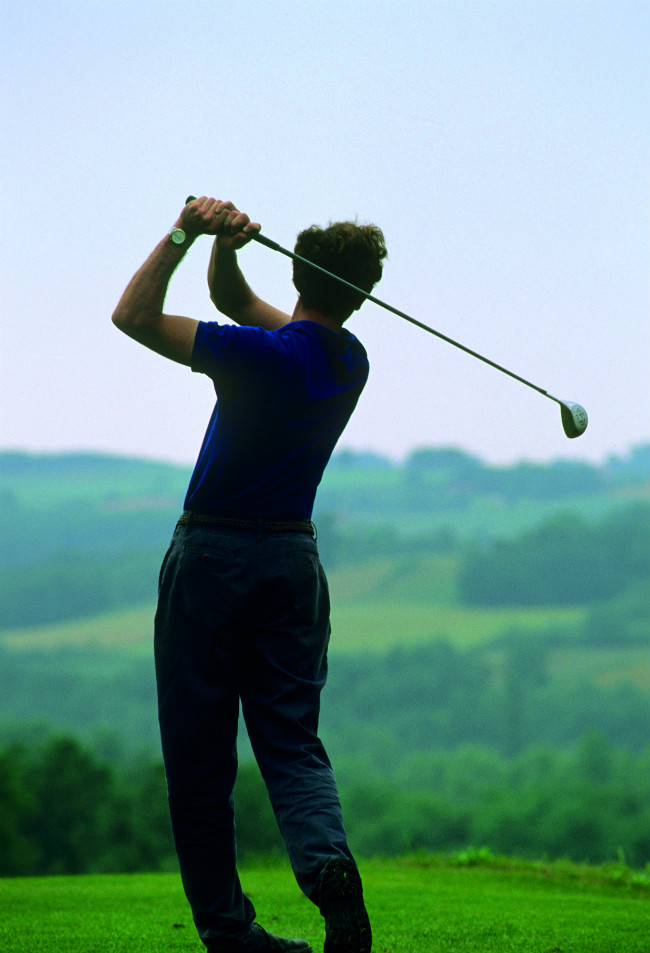
Practice at twilight at Albret Golf Club in Gascony. Photo credit: Golf d’Albret
Share to: Facebook Twitter LinkedIn Email
More in Ryder Cup
Leave a reply
Your email address will not be published. Required fields are marked *




REPLY
REPLY
REPLY
REPLY